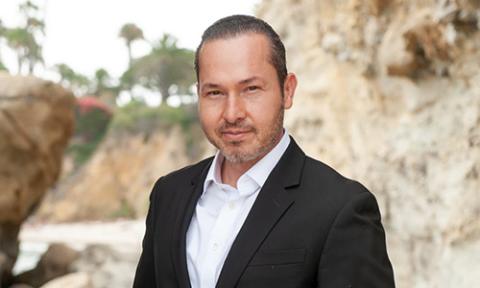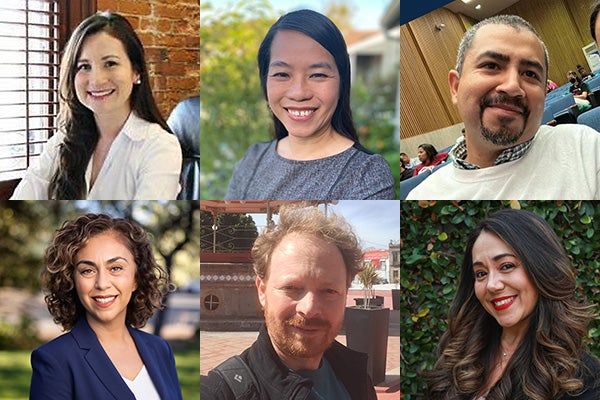In solitary, but not alone
UCLA Law alumni advocate for the release of Eyvin Hernandez (B.S.’01, J.D. ’05) who is unlawfully detained in Venezuela

“I need a translator!”
Luan Huynh (J.D. ’05) teased her friend and former UCLA Law peer Eyvin Hernandez via text on April 5. He had gone silent in their conversation about a mutual friend’s funeral, which would likely be held in Spanish. She asked if he was going to be back from vacation in time for the viewing on April 23 and the mass on April 24.
No answer.
Huynh, who works for the California Senate, thought it was strange. Hernandez often tried to call her within 48 hours of calls and texts. Maybe he decided to extend his travels, she thought. Huynh met Hernandez the summer before their first year at UCLA Law during an orientation for non-traditional students. They had remained close friends, forever bonded by their experiences in law school.
Eventually, she found out why Hernandez had stopped responding.
He was being unlawfully detained in Venezuela.
Yvonne Ballesteros (J.D. ’06) found out on May 10. She remembers the date because she was celebrating Mexican Mother’s Day.
Shaffy Moeel (J.D. ’05) had been watching TV with her partner and stood up from the couch as soon as she read the text alerting her of the news.
Within weeks, 40 UCLA Law alumni—from top private firms to public service positions—were pulling their resources and smarts to bring Hernandez home. They mobilized on WhatsApp. Who knows someone at the State Department? Who has access to elected officials? Who knows someone in the media? Whose Spanish is the best?
Details emerge

Over the coming weeks, more information about Hernandez’s situation emerged.
Hernandez, who has been a public defender with the Los Angeles County Public Defender’s Office for the past 15 years, was on vacation in Colombia. While in Medellin, Hernandez met a friend, a Venezuelan national. The friend told Hernandez she needed to get her passport stamped at the border in order for them to travel by airplane to a beach town, before Hernandez was scheduled to return home on April 3.
Hernandez and his friend took an overnight bus to Cucuta, Colombia, a border town. At the bus depot, they asked if anyone knew where the friend could get her passport stamped. A taxi driver told them he knew where and could take them. While about to take the taxi to the office, a third person hopped in the taxi, saying he would direct them. They were told to walk down a dirt road and over a bridge with other people walking in both directions. There were no signs that they were entering Venezuela. They reached what appeared to be a military post. Hernandez and his friend said that they wanted to get her passport stamped and were told that passport stamping had not occurred in that location for over three years. One of the men said if they wanted to cross, Hernandez needed to give them $100 U.S. dollars. Hernandez told the guard he didn’t have the cash. He told them he was an American, and that he wanted to be taken back and had no intentions of entering Venezuela. They were then approached by men in masks who were heavily armed. Black hoods were placed over Hernandez’s and his friend’s heads, and they were taken away in the back of a pickup truck. It would be 51 days until Hernandez saw the light of day.
According to Hernandez’s half-brother, Henry Martinez, his family lost contact with Hernandez on March 29, after which they filed a missing person’s report with the U.S. Department of State. A Venezuelan lawyer contacted Hernandez’s family on April 4; they received a voicemail from Hernandez shortly thereafter. After this initial voicemail it would be 57 days until Hernandez’s family heard from him again.
The Venezuelan government charged Hernandez with criminal association and conspiracy; he faces 16 years in prison if found guilty. The friend whom he accompanied to the border is accused of criminal association and the additional charge of migrant smuggling. Neither had intentions of entering Venezuela.
After being arrested at the Colombia-Venezuela border, Hernandez was transferred hundreds of miles away to a maximum-security prison in the capital of Caracas, where many of Venezuelan President Nicolás Maduro’s political prisoners are held. As reported by the Associated Press, Maduro’s government holds the largest contingent of Americans suspected of being used as bargaining chips. Hernandez’s investigation was supposed to last 45 days; instead, he’s been locked in solitary confinement in a windowless room for six months.
The State Department recommends that Americans avoid travel to Venezuela, and never enter without a visa, which is nearly impossible to obtain since the U.S. broke diplomatic relations with Maduro in 2019, after recognizing opposition lawmaker Juan Guaidó as the nation’s legitimate leader.
Alumni mobilize
The alumni fighting for Hernandez’s release have full-time jobs. Many have young children.
Huynh says she tries to work on Hernandez’s case from 6-9 a.m. so she can get in a full three hours before she officially starts work for the day. She takes additional calls after 5 p.m. and often stays up until 2 a.m. to do research.
“I’ve never worked harder than I have right now. I think that’s true for a lot of us. It speaks to the direness of the situation, but it’s also a testament to how Eyvin lives his life and how that calls for a special kind of reaction,” she says.
Moeel, a criminal and civil litigator, works on Hernandez’s case after she puts her kids to bed. “It doesn’t feel like work because the reward is so personal,” she says.
Ballesteros, a litigator, has been friends with Hernandez since they were undergrads at UCLA. Back then, they attended the campus Latino festival together and relieved stress by salsa dancing at the Ackerman Union on Thursday nights.
“We were first-generation college and law students. Eyvin always checked in on me,” Ballesteros says. When she thinks of Hernandez, she thinks of his calming presence and how everyone looks to him for advice. “He’s a true representative of Los Angeles and those of us who are first-generation, worked our way through life, and are trying to give back to our community,” she says.
“He comes from a working-class immigrant family like me,” says Gladdys Uribe (J.D. ’06), an immigration attorney. “We come from people who worked in the food industry and service jobs. These are the people he swore to defend,” she says.
Many of the alumni advocates know each other from UCLA Law’s David J. Epstein Program in Public Interest Law and Policy and Critical Race Studies Program. Many bonded over their experience of being students of color and their interest in public service and human rights work. Hernandez’s commitment to justice and equality is an oft-repeated anecdote among them.
“Eyvin was a really good student. With his degrees in math and physics, he could have gone into patent law and made a lot of money. But he was always going to advocate for the most marginalized,” says Moeel.
Uribe’s recollections are similar. “He always intended to a be a social advocacy lawyer. He never strayed from that mission. He’s pure in that sense. He’s one hundred percent committed to serve poor immigrant communities,” she says. “He will go that extra mile for his clients and friends. He’s been with me for all the important parts of my life—law school, my wedding, after the birth of my girls.”
Hernandez’s UCLA ties run deep. In addition to being a double Bruin (he majored in math and physics and then earned his J.D.), he recently helped students prepare for their oral arguments in court at the UCLA Law Bail Practicum.
His fellow alumni, family, colleagues, UCLA Law leadership and faculty from UCLA Law’s Promise Institute, are all working together to bring him home. They’ve submitted a complaint to the UN Commission on Human Rights. They’ve contacted the Human Rights Watch and Amnesty International. They’ve reached out to families of people who have also been wrongfully imprisoned and have sought their advice. Together, they’ve had to figure out how to get basic provisions to Hernandez, who has been without medical care or adequate clothing and food.
A punch in the gut
On Saturday, October 1, seven men were released from Venezuelan custody. Hernandez was not among them.
When Ballesteros found out, she says, “It felt like a punch to the gut.”
While they are happy for the seven Americans who were released and their families, they can’t help but be devastated that their friend was not among them.
“It was a huge blow,” says Silas Shawver (J.D. ’05), the deputy attorney general for the California Department of Justice. “We’re worried this reduces the urgency of his case.”
The alumni advocates are focused on working with the State Department to have Hernandez receive the designation of unlawful detainment, which would turn his case over to the Special Presidential Envoy for Hostage Affairs. While not having this designation doesn’t preclude the State Department from negotiating for his release, it’s not legally obligated to do so until then.
In a voice message that was secretly recorded on August 21 and reported by the Associated Press, Hernandez said, “This place is meant to break you psychologically and spiritually. We’re all innocent, yet we’re being charged and treated as terrorists.” In the same statement, he said the uncertainty, isolation and human rights violations are taking their intended toll. He said that two Americans had already attempted death by suicide and a third was having mental breakdowns daily. “If you don’t get us out soon, then there might not be anyone left to save.”
--Jill Kato for UCLA Law
To sign the petition for Hernandez’s release, visit the Change.org petition.
For the latest information and for ways to help, access the advocacy website here.